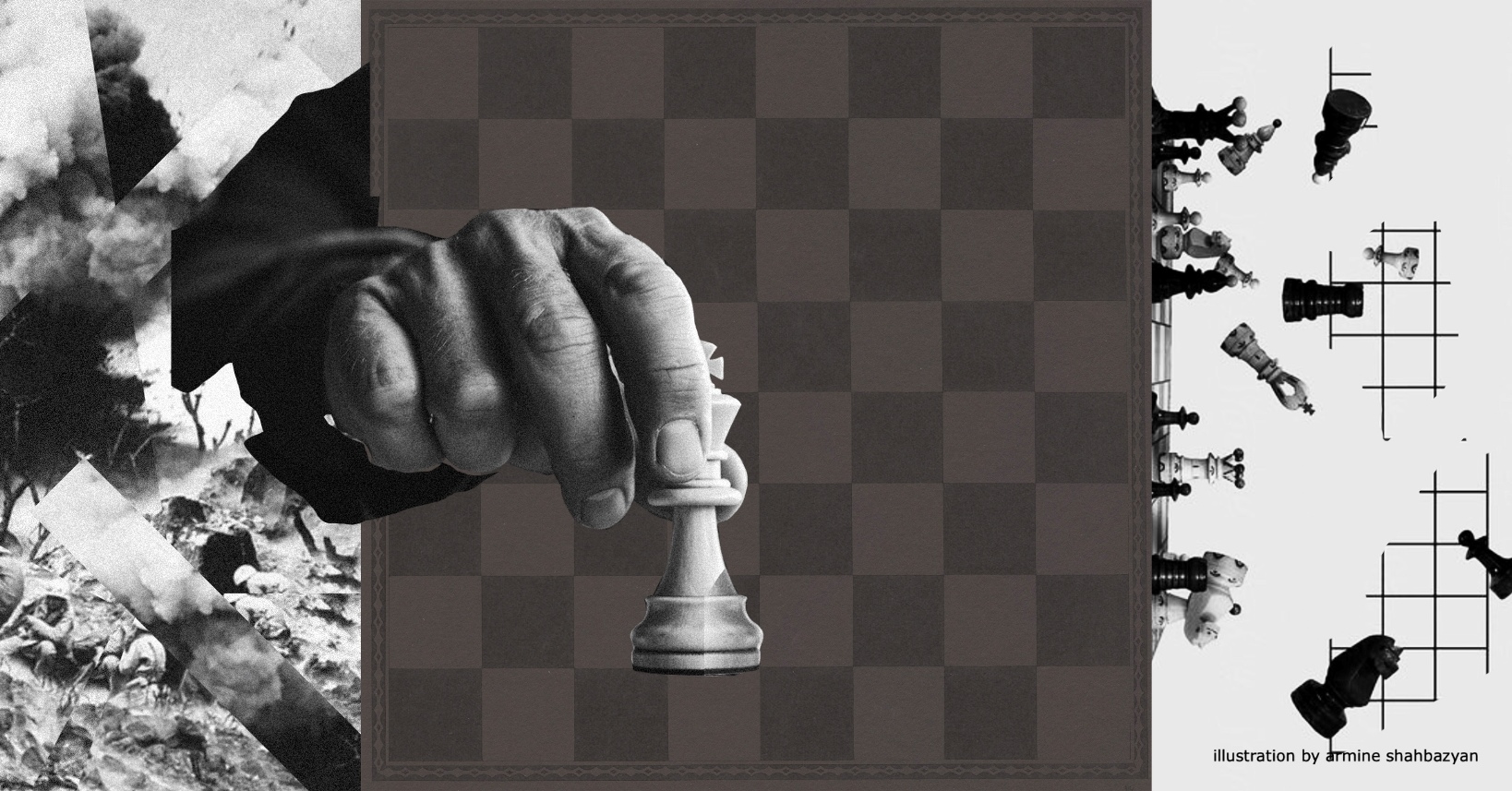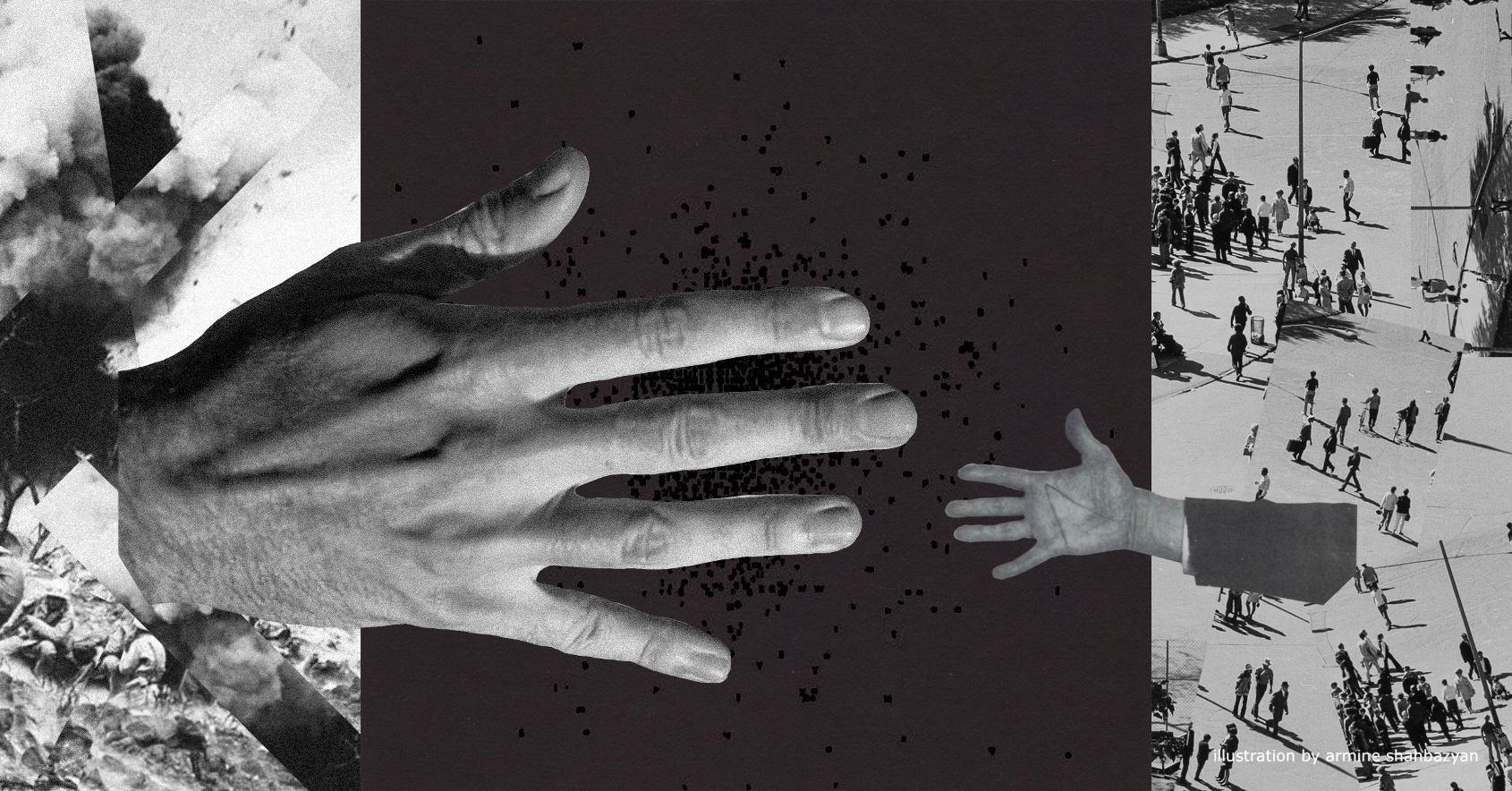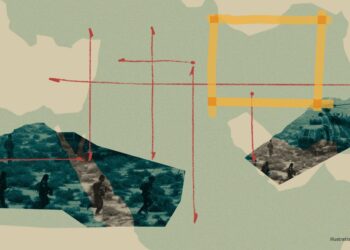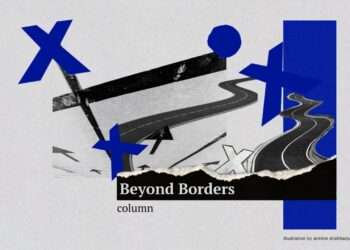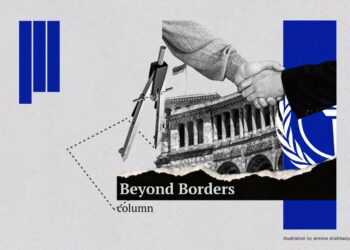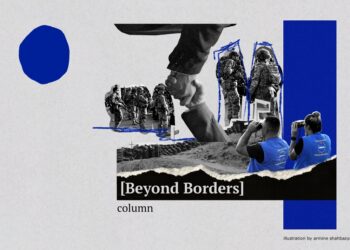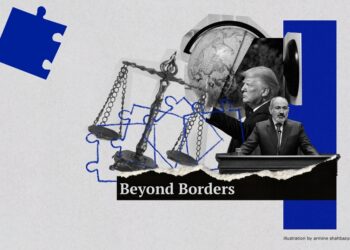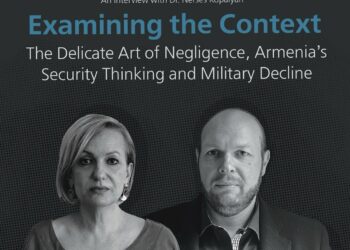Listen to the article.
Part I of this article summarized and analyzed Azerbaijani President Ilham Aliyev’s escalating preconditions, accusations and threats against Armenia as expressed in his December 2024 and January 2025 interviews. These narratives underpin Baku’s coercion tactics against Armenia, aiming to justify its obstruction of the peace agreement, legitimize potential military offensives, and support its ambitions to become a regional hegemon. The article also examined Armenian Prime Minister Nikol Pashinyan’s responses and wider Armenian concerns and perspectives on these issues.
Part II examines Aliyev’s narratives concerning international actors, categorized as Western and non-Western. Among Western actors, it analyzes his views on France, the EU, the United States, and briefly, Canada. Beyond crafting narratives about these actors, Aliyev has warned them against supporting Armenia. The analysis of non-Western actors covers Russia, Turkey, Iran and Georgia. As Pashinyan has not directly responded to Aliyev’s characterizations of these international actors, Part II analyzes the motivations and strategic objectives behind Aliyev’s rhetoric.
Blaming U.S.–EU Cooperation With Armenia for its “Partiality”
Aliyev called the cooperation framework signed by Washington, Brussels and Yerevan in April 2024 in Brussels, “an unprecedented and troubling development.” He stated that while the agreement’s military component was officially removed, “de facto, it remains there.”
Aliyev cited the EU and United States’ alleged “partiality” toward Armenia as the reason for rejecting EU mediation in the Azerbaijan-Armenia normalization process and declining U.S. Secretary of State Antony Blinken’s invitation for a trilateral meeting in December 2024. He insisted that Azerbaijan favors a bilateral negotiation format and accused the West of pursuing policies that undermine Azerbaijan’s sovereignty.
Analysis
The joint EU-US-Armenia meeting was convened to support Armenia’s sovereignty, democracy, territorial integrity and socio-economic resilience. The agreements reached did not include any hard security components, they focused on Armenia’s political reforms, economic development, and humanitarian support.
The U.S., the EU, and France worked to facilitate dialogue and advance the peace process between Armenia and Azerbaijan during 2021-2023. Several high-level meetings took place in various formats: a meeting at the European Political Community (EPC) summit in Prague, facilitated by French President Macron and European Council President Charles Michel in October 2022; a session at the Munich Security Conference in February 2023, facilitated by State Secretary Antony Blinken; a meeting in Brussels in July 2023, hosted by Michel; and another in Washington, D.C. in May 2023, hosted by Blinken.
As analyzed in previous articles, Aliyev leveraged these platforms to take advantage of the prioritization of territorial integrity amid Russia’s war in Ukraine, pressuring Armenia to recognize Nagorno-Karabakh as part of Azerbaijan. This was followed by a blockade of the Armenian population in 2022–2023 and a military offensive in September 2023 that resulted in their forced displacement.
Despite statements from the U.S. and the EU declaring the ethnic cleansing of Nagorno-Karabakh Armenians unacceptable, they were ultimately unable to prevent it, leading to frustration among Armenians. While resentment is strongest within pro-Russian, conservative, and Western-skeptic circles, it is also partially shared by liberals. The latter consider Russia as a key complicit actor, however, they also draw comparisons between the Nagorno-Karabakh and Kosovo conflicts, and given their similarities, scrutinize how the U.S. and the EU have handled both cases.
After Baku absorbed Nagorno-Karabakh, it rejected Western mediation platforms and started harassing Western actors, claiming to prefer bilateral talks. Azerbaijan refused to attend a meeting at the EPC summit in Grenada in October 2023—a meeting facilitated by EC President Michel, Macron, and German Chancellor Olaf Scholz. The summit proceeded without Azerbaijan, emphasizing peace and normalization efforts between the two countries, which drew Aliyev’s disapproval. Aliyev rejected international mediation mechanisms by citing autocratic interpretations of sovereignty and non-intervention, in order to take advantage of the power imbalance and use coercion in bilateral peace negotiations. However, Aliyev later met with Pashinyan on the sidelines of the BRICS summit in Kazan in October 2024, demonstrating his preference for Russian-facilitated platforms.
Until recently, Baku portrayed Armenia as a Russian proxy while positioning itself as more pro-Western. However, when Armenia began strengthening its ties with the West—a shift analysts have described as a “pivot”—Azerbaijan responded by claiming Armenia had found “new patrons” and began challenging the West.
The West’s support for Armenia stems from two key factors: Armenia’s security challenges and the threat of a new armed conflict in the Southern Caucasus, and the country’s consistent democratic trajectory since 2018. While Azerbaijan is an important hydrocarbon supplier to Europe, it remains a highly autocratic state. The attempts to neutralize French, EU and U.S. support for Armenia are part of Azerbaijan’s and Russia’s hybrid war aimed at halting and reversing Armenia’s Western realignment––particularly its emerging aspirations for EU membership and its recent strategic partnership with the U.S.
Framing Support of Armenia’s Defense Sector As “Arming Armenia”
Aliyev accused France and India of openly supporting Armenia’s military buildup by supplying “lethal weapons,” while alleging that the U.S. was doing so covertly. He claimed that they had “tracked military transport planes landing at Armenian airports, delivering weapons there.” He criticized these actions as destabilizing and stated, “Both Armenia itself and its new patrons do not want peace. They are driven by ideas of revenge.”
Aliyev characterized Western support for Armenia’s defense sector as incompatible with ongoing peace negotiations. He argued that this military assistance posed a significant threat to peace efforts, despite Azerbaijan’s commitment to it. “We want peace. We want the page of war to be turned,” he stated, warning that if the West continues to arm Armenia, “there should be no further claims against us afterward,” suggesting that the West would bear responsibility for any potential escalation.
Aliyev criticized the European Peace Facility (EPF) for its role in arming Armenia, questioning both its purpose and transparency. He argued that EPF, designed to promote peace, was instead being misused for Armenia’s military buildup. He expressed dissatisfaction with its initial assistance package for Armenia and concern about potential future aid. These actions, Aliyev argued, undermined the EU’s credibility as a neutral mediator, heightened regional tensions, and jeopardized prospects for a peace treaty.
Aliyev then issued a clear demand: Armenia must halt its military buildup immediately. He urged France and other weapons-supplying countries to cancel their contracts and ensure the return of weapons already delivered. “This is our condition. Let them take it as they please.”
Analysis
Armenia is unable to compete with Azerbaijan’s military capabilities due to significantly fewer economic resources, delayed defense reforms, and the absence of strategic allies. Azerbaijan continues to receive offensive armaments and military technologies from Israel, Turkey, Pakistan, Serbia and Italy, and has begun developing military industry projects with Slovakia. It also conducts numerous military exercises with Turkey and other partners. Its 2025 military budget is triple Armenia’s—a fact Aliyev himself has highlighted, boasting that Armenia cannot match Azerbaijan’s military capabilities even with Western support.
Furthermore, Yerevan has made it clear that it is rebuilding its defense sector in accordance with the UN Charter’s provision or sovereign nations’ right to self-defense. As Pashinyan has repeatedly stated, Armenia has no aspirations to reclaim Nagorno-Karabakh and does not even intend to recover its border areas occupied by Azerbaijan through military means. Instead, the Armenian government is committed to resolving these issues through peaceful border delimitation.
Aliyev appears concerned that support for Armenia’s defense deterrence capabilities could reduce the significant military imbalance and larger power disparity, revealing Baku’s intention to either launch military offensives or use the threat of military force against Armenia. Aliyev’s false claim—that support for Armenia’s defense sector undermines peace in the region—contradicts the principle that a just and equitable peace is more achievable and sustainable between countries with balanced military capabilities.
Azerbaijan’s demands to stop military contracts with Armenia, return received military supplies, and impose restrictions on the Armenian army are unprecedented in international law and relations. Baku has attempted to legitimize these demands by portraying Armenia as an aggressor, occupier, and even a “fascist” country. Ironically, it is Azerbaijan that has initiated all wars and military offensives against Nagorno-Karabakh Armenians and Armenia.
Furthermore, Aliyev is not only spreading false narratives but also explicit disinformation. The U.S. State Department has refuted allegations about supplying “lethal weapons” to Armenia, clarifying that “U.S. security assistance to both Armenia and Azerbaijan is focused on strengthening interoperability with the U.S. and NATO forces, increasing military professionalization, and securing their borders with Iran…The United States calibrates all its security assistance to Armenia and Azerbaijan to ensure that it is not usable for offensive purposes and does not undermine or hamper ongoing efforts to negotiate a durable and dignified peace.” The U.S. supports only non-combat security activities for Armenia’s Armed Forces, such as military exercises, cybersecurity and soft skills.
The EPF has not committed to providing any lethal equipment or weapons to Armenia. It will allocate a modest €10 million to Armenia’s Armed Forces to enhance their logistical capacities, improve protection of civilians during crises and emergencies, and increase their interoperability. The EU remains cautious about supplying lethal equipment and weapons through the EPF, having approved such support only for Ukraine and Benin.
Azerbaijan, in coordination with Russia, is working to prevent Armenia from strengthening its defense capabilities. Both countries have opposed French, U.S., and EU support for Armenia’s defense sector, seeking to keep Armenia reliant on Russia. This serves Russia’s interests by preserving its political influence, maintaining its military presence and preventing Armenia’s exit from the Collective Security Treaty Organization, despite Russia’s failure to fulfill its commitments. Moscow and the CSTO have not only withheld political and defense support from Armenia in the face of Azerbaijani aggression but have also endorsed Azerbaijani claims and narratives, including at the UN Security Council.
As part of its lawfare against Armenia, Azerbaijan is attempting to legitimize a potential military offensive against Armenia to prevent it from restoring its defense capability and reduce power disparity. As part of its cognitive warfare, the Azerbaijani propaganda machine is also warning “that foreign powers and weapons won’t shield it from Azerbaijan’s ‘Iron Fist,’ as seen in the 2020 war and 2023 anti-terrorist measures.”
Smearing France on Multiple Fronts—and a Side Note on Canada
Aliyev repeated his allegations about French “patronage” of Armenia, President Macron’s pro-Armenian “biased stance,” and confrontational approach toward Azerbaijan during and after the 2020 Karabakh War. He condemned France for criticizing Azerbaijan’s actions at the UN Security Council, framing it as an attempt to undermine Azerbaijan’s sovereignty. Aliyev also accused former French Prime Minister Michel Barnier of “illegally visiting Karabakh” during his time as a politician. He claimed France was “arming” Armenia and implied it would bear responsibility for any regional escalation. He further criticized France for allegedly orchestrating a coordinated campaign to undermine Azerbaijan’s achievements, including its hosting of COP29. However, he implied that before Macron’s presidency, Azerbaijan and France had maintained positive relations in many areas.
Aliyev denounced Macron for “exorbitant ambitions and unfounded megalomania,” which he argued had transformed France into a “failed state.” Aliyev suggested that Macron was using Azerbaijan as a scapegoat to divert attention from France’s domestic problems. He remarked, “It seems Macron cannot live without Azerbaijan. He has some kind of obsession and wants to blame all his sins on us.”
He claimed France had failed in New Caledonia, Mayotte, Corsica, African countries, and Lebanon, stating that events in these regions revealed the “disgusting face of French colonialism.” He also alleged that France was “meddling” in Georgia. Additionally, he criticized France for “Olympic disgrace” and disrespect for “traditional values”, claiming that Pope Francis deliberately avoided the re-opening ceremony of Notre-Dame and instead visited Corsica.
Drawing a parallel, Aliyev compared Macron to Canada’s Prime Minister Justin Trudeau, alleging that both leaders had displayed an anti-Azerbaijani bias. “Just yesterday, it was reported that Mr. Trudeau, a close friend of Armenia and Pashinyan, was also forced to resign. This country, which was very anti-Azerbaijani during and after the Second Karabakh War, stands not far from France.” By linking these leaders, Aliyev portrayed them as part of a broader alignment of liberal Western leaders against Azerbaijan.
Analysis
Clearly, Aliyev has a “Macron problem,” targeting the French president personally in nearly every public address over the past two years with increasingly hostile rhetoric. However, France’s criticism of Azerbaijan and support for Armenia extends far beyond Macron or his political camp—it represents a broad national consensus across the right, left, and center. Some French politicians have advocated for stronger support of Armenia and tougher measures against Azerbaijan.
Azerbaijan directs particularly harsh criticism at France, more so than the EU and U.S., because France alone among Western countries provides Armenia with military equipment, while the EU and U.S. offer only soft security support. The French government has supported both Armenia’s and Azerbaijan’s territorial integrity and hasn’t aligned with the National Assembly and Senate’s recognition of Nagorno-Karabakh. Despite this, Azerbaijan retaliates against France for criticizing Azerbaijan’s violation of Armenia’s territorial integrity, military aggression, blockade, and ethnic cleansing of Armenians in Nagorno-Karabakh. By attacking France for highlighting Azerbaijan’s violations of international law and use of force in the UN Security Council, Baku not only challenges France—a NATO, EU and UN Security Council permanent member, but also undermines the mandate of the UN Security Council itself.
Baku targets not only the France-Armenia political and defense partnership, but also manipulates anti-colonial narratives in the French Overseas territories, Corsica and Sub-Saharan Africa, aiming to distract France from the South Caucasus and pressure it to cease its political and defense support for Armenia. Targeting France also serves both as a broader rejection of liberal values and as an attempt to deflect accusations from France and European institutions regarding Azerbaijan’s own human rights violations. Azerbaijan’s portrayal of French global influence resembles those employed by Russia, China and Turkey about Western dominance over developing countries—framing influence as interference in internal affairs and sovereignty, meant to perpetuate their dependence. Azerbaijan is simultaneously working to increase its influence in Africa and secure the votes of African nations, which hold significant representation in UN bodies. Azerbaijan presents itself as a champion against “Western colonialism and neo-colonialism” and a “defender of historical justice, equality and respect for sovereignty”––a disingenuous position given its elimination of Nagorno-Karabakh’s efforts towards self-determination, which bears parallels to decolonization struggles.
Allegations of EU Partiality in Regional Normalization
Aliyev accused the EU of partiality in the Azerbaijan-Armenia normalization process. He criticized the EU’s financial and political support to Armenia through three channels: the Cooperation Platform for Armenia, the EU Mission in Armenia (EUMA), and the European Peace Facility (EPF). According to him, these actions undermined trust and demonstrated clear favoritism.
He claimed the EU violated existing agreements by expanding and extending its observation mission in Armenia without Azerbaijan’s consent. “The European Union unequivocally took Armenia’s side in the normalization process,” Aliyev stated, arguing that this undermined the EU’s credibility as a neutral mediator.
Aliyev also expressed strong criticism of Josep Borrell, the EU’s High Representative for Foreign Affairs, referencing Borrell’s controversial 2022 comment comparing Europe to a “garden” and the rest of the world to “jungles.” Aliyev denounced this as typical of the EU’s “colonial mindset,” adding, “If we are jungles, then stay away from us and don’t interfere in our affairs.”
Analysis
Since 2023, Aliyev has employed aggressive rhetoric to pressure and intimidate the EU, seeking to secure impunity for Azerbaijan’s actions against Nagorno-Karabakh and Armenia. Baku condemns any EU official who criticizes its policies or expresses support for Armenia, with particular hostility toward Josep Borrell, the EU’s most vocal critic of Azerbaijan’s actions in 2023-2024. Baku has also been demanding the withdrawal of the EUMA as an official precondition for the peace agreement. Azerbaijan’s rhetoric against the EUMA started since its establishment; however, it has intensified lately, with Azerbaijan labeling it as the “EU’s spy mission”. Most likely, Baku’s harassment tactics are meant to prevent the extension of the mission’s initial mandate, or at least to delegitimize it. On January 30, 2025, the European Council adopted a decision extending the mandate of the EUMA for a further two years, until February 19, 2027. Azerbaijan’s propaganda machine responded by accusing the EU of pushing Armenia toward new provocations while emphasizing that Azerbaijan is “closely monitoring” the mission’s activities and pointedly reminding that it operates without Baku’s approval. The claim of “monitoring” an international monitoring mission is unprecedented, directly challenging the EU’s Common Security and Defense Policy and broader multilateral observation mechanisms. Notably, since October 2022, the EU has proposed deploying a monitoring mission on both sides of the border, but Azerbaijan has categorically rejected the idea.
Mixed Armenian views on the EU’s role in the Armenian-Azerbaijani conflict show that Aliyev’s claims about EU bias are unfounded. There has been widespread criticism in some Armenian circles of the EU’s energy deals with Azerbaijan, its designation of Azerbaijan as a “reliable partner,” and its perceived lenient stance toward Baku. Critics argue that the EU has failed to prevent, acknowledge, or condemn the ethnic cleansing in Nagorno-Karabakh. They also point out that the EU has not applied conditionality for its deals with Azerbaijan, nor imposed restrictive measures on Azerbaijan for its actions against Nagorno-Karabakh Armenians and its occupation of Armenia’s border areas.
Many Armenians believe the EU’s cautious approach stems from its reliance on Azerbaijani energy supplies, leading to accusations that Brussels puts energy security and geopolitical interests ahead of its commitment to democracy and human rights.
In spite of those complexities, most Armenians are increasingly positive about the EU. With the exception of pro-Russian circles, Armenians highly appreciate the EUMA as a soft deterrent against Azerbaijan’s creeping annexation and military threats. Armenia’s liberal experts have welcomed the EPF’s first assistance package approved in July 2024, though its impact remains to be seen. Recent IRI surveys show growing support for EU membership in Armenia. The Armenian executive and legislative branches have taken steps towards a possible “Euro Vote,” indicating Armenia’s interest in EU membership, and included it in the agenda of the February sitting of the National Assembly. This could also explain the intensification of a coordinated Russian-Azerbaijani hybrid campaign against EU initiatives for Armenia.
Blaming Biden, Praising Trump: A Tale of Contrasts in Washington’s South Caucasus Policy
Aliyev accused the Biden administration of abandoning its previously balanced approach to the South Caucasus, by supporting Armenia, thus undermining trust and creating tensions with Azerbaijan. He claimed that key U.S. State Department officials were “Soros-affiliated individuals” whose “Soros-driven governance style” had destabilized U.S.-Azerbaijan relations. Aliyev further alleged that the Biden administration was providing “covert arms supplies to Armenia”—a move he characterized as a “direct threat” to Azerbaijan. He argued that the administration had turned U.S.-Azerbaijan relations into a “casualty” of U.S.-Armenia relations, diminishing previous diplomatic progress.
He framed the Biden administration’s stance as part of a broader pattern of U.S. interference, alleging that organizations like USAID undermined Azerbaijan’s sovereignty. He suggested Azerbaijan might ban such organizations, following Russia’s example, if these activities persisted. He also accused U.S.-funded media outlets like Voice of America and Radio Liberty of tarnishing Azerbaijan’s reputation.
Aliyev criticized Biden’s administration for “double standards”, particularly regarding the Karabakh issue. He questioned why the U.S. supported Ukraine’s territorial integrity while punishing Azerbaijan for restoring its own. He accused the U.S. of ingratitude, citing Azerbaijan’s logistical support in Afghanistan, and argued that Azerbaijan was sanctioned—through the restoration of Section 907 of the U.S. Freedom Support Act restricting aid—only after its support was no longer needed.
Aliyev praised President Donald Trump’s emphasis on traditional family and moral values, saying they align with both Azerbaijani society’s principles and those of the current Georgian authorities—in contrast to the values of Biden’s administration and Macron’s government. He also commended Trump’s clear and direct communication style. Reflecting on Trump’s first term, Aliyev described U.S.-Azerbaijan relations as positive, noting progress in multiple areas without significant issues. He expressed optimism that Trump’s potential return could strengthen strategic relations between the U.S. and Azerbaijan.
Analysis
Aliyev’s narratives criticizing Biden’s administration and praising Trump are disingenuous. Like the EU, Biden’s administration has also been soft on Azerbaijan.
Independent Azerbaijani scholar Altay Göyüşov has noted that the Biden-Blinken administration hasn’t imposed any sanctions on Aliyev’s “oppressive government” and has done “their best to avoid sanctioning him,” instead “warning him with empty words.” He added that “Aliyev seems to anticipate that the Trump administration will actively support his aggressiveness.”
Despite U.S. officials declaring they would not “accept” the ethnic cleansing of Nagorno-Karabakh Armenians, they failed to prevent Baku’s blockade, military offensive, and forced displacement. This has drawn frustration among Nagorno-Karabakh Armenians and criticism in Armenia and diaspora. USAID Administrator Samantha Power’s delayed visit, which occurred only after the mass exodus of Nagorno-Karabakh Armenians, has also come under strong criticism. Freedom House has reported on and acknowledged the ethnic cleansing, and some U.S. lawmakers have used this term, however, the U.S. executive branch hasn’t acknowledged displacement of Nagorno-Karabakh Armenians as ethnic cleansing.
The U.S. has provided significant military assistance to Azerbaijan over the years. On November 15, 2023, the U.S. Senate adopted the “Armenian Protection Act of 2023” that suspends all military aid to Azerbaijan by repealing the Freedom Support Act Section 907 waiver authority for the Administration with respect to assistance to Azerbaijan for fiscal years 2024 or 2025.
The U.S. had been more assertive in supporting Armenia’s territorial integrity and sovereignty—notably, Secretary Blinken’s intervention reportedly helped halt Azerbaijan’s major military offensive against Armenia in September 2022. While the U.S. has positioned itself primarily as a facilitator of the peace process and began providing soft security support to Armenia in 2024, it has never indicated any intention to supply weapons.
Through this unjustified rhetoric before the signing of the Charter on Strategic Partnership Between the United States and Armenia on January 14, 2025, Aliyev was most likely attempting to either prevent the charter or to delegitimize it in advance—thus, blocking its implementation under the incoming U.S. administration. Such strategic documents, however, are usually agreed upon between the outgoing administration and the incoming administration’s transition team.
Aliyev’s mockery of the State Department under Blinken, praise for President Trump, and manipulation of domestic discourse in the U.S. appear both opportunistic and calculated. While Trump has voiced his commitment to promoting peace in conflict zones, and Armenia has demonstrated its dedication to the peace process, Azerbaijan continues to sabotage peace negotiations. For Trump, Christian values are important and he has opposed and been vocal about Christian persecution. However, Azerbaijan has launched military offensives against Armenia, achieved ethnic cleansing of Armenians in Nagorno-Karabakh, and is now carrying out destruction and appropriation of Armenian Christian cultural heritages. Until recently, when liberal views were more popular, the Azerbaijani propaganda machine frequently mocked France and Europe in general for supporting Armenia, alleging that it was due to Christian solidarity and their being Islamophobic.
Aliyev’s attempt to manipulate the discourse on Euro-Atlantic unity and stoke divisions between the U.S. and France—two long-standing allies—is purely opportunistic. The European strategic autonomy concept promoted by Macron is not only essential for the EU but also aligns with the Trump administration’s goal of reducing European dependence on the U.S.
Azerbaijan, despite its significant energy resources and key alliances with U.S. allies Israel and Turkey, has also signed strategic agreements with both China and Russia. In July 2024, Azerbaijan and China formed a strategic partnership through a joint declaration focusing on political and economic cooperation. Previously, in February 2022, Azerbaijan and Russia signed the “Declaration on Allied Interaction,” elevating their relationship to an allied status. In contrast, Armenia has suspended its CSTO membership, reduced its security dependence on Russia, distanced itself from Moscow, and diversified its partnerships with the West.
Key figures in the Trump administration have been vocal in their support for Armenians and critical of Azerbaijan’s actions—most notably Secretary of State Marco Rubio and Tulsi Gabbard, nominated to serve as Director of National Intelligence. However, the administration’s overall policy toward Armenia and Azerbaijan remains to be seen.
Aliyev seems to imitate Trump’s “might-makes-right” approach, leveraging power to dictate terms in international affairs. However, he disregards a crucial element of Trump’s strategy—American exceptionalism. While Trump’s tactics were underpinned by the belief that the U.S. has a unique and justified global role, Aliyev lacks any comparable foundation to legitimize his actions. Instead of presenting Azerbaijan as a global force with a broader mission, he relies solely on militarism and coercion, making his approach appear as sheer aggression rather than a calculated geopolitical strategy.
On Azerbaijan’s Relations With Russia
In recent interviews, Aliyev has stated that he views Russia as a reliable partner and ally, emphasizing their aligned foreign policy priorities, which are formalized in the “historical” Declaration on Allied Relations––signed by both countries on the eve of Russia’s invasion of Ukraine. This agreement, he noted, represents the “highest form” of cooperation across political and economic spheres. He also highlighted the importance of Putin’s recent visit to Azerbaijan, viewing it as evidence of their strong partnership. Aliyev also mentioned Azerbaijan’s plans to purchase Russian armaments, though this process is temporarily on hold while Russia prioritizes its own defense production needs.
Addressing the current sanctions against Russia, he expressed support for its leadership’s determination to minimize their impact. He remarked that “Russia is consolidating” during these challenging times and encouraged its continued perseverance.
Analysis
In his interview, given to a pro-Kremlin Russian propagandist, Aliyev maintained a consistently positive tone about Russia and expressed solidarity with Moscow regarding Western sanctions. During a second interview, held shortly after the crash of an Azerbaijani airplane—allegedly caused by a Russian missile—Aliyev conspicuously avoided mentioning either the incident or Russia. Despite expectations that the crash would damage Azerbaijani-Russian relations, he offered no criticism of Moscow.
While Aliyev has historically portrayed Armenia as Russia’s proxy to gain Western support in Azerbaijan’s conflict with Armenia, he steered clear of direct references to Armenia-Russia relations in these interviews. Nevertheless, in his first interview, he suggested that Armenia is distancing itself from Russia and its openness to a EU and NATO presence in the South Caucasus posed a “direct threat” to Azerbaijan. This rhetoric closely mirrors Russia’s narrative about Ukraine, demonstrating Azerbaijan’s alignment with Moscow’s geopolitical perspective.
Despite Russia’s failure to uphold its commitments as Armenia’s traditional ally, both Azerbaijan and Russia share a vested interest in maintaining Armenia’s dependence on Moscow. Russia has withheld political and military support from Armenia during Azerbaijani aggression, choosing instead to align with Baku’s positions––including at UN Security Council meetings, and has aimed to preserve its political influence and military presence in Armenia.
Azerbaijan and Russia have both advocated for an extraterritorial corridor (the so-called Zangezur Corridor) through Armenian territory, to be controlled by Russia’s FSB, reinforcing their shared geopolitical objectives. They have also coordinated criticism of Western support for Armenia, including the France-Armenia defense cooperation, the EU’s initiatives through EUMA and the EPF, and U.S.-Armenia military exercises.
Through these efforts to neutralize Western support, Azerbaijan and Russia seek to weaken Armenia’s security and reverse its shift toward Western-aligned foreign and security policies, thereby preventing stronger partnerships with Western actors.
Azerbaijan’s Strategic Alliance With Turkey and Islamic Solidarity
Aliyev emphasized the deep and multifaceted alliance between Azerbaijan and Turkey, describing it as a cornerstone of Azerbaijan’s foreign, defense, and economic policies. He highlighted the military dimension of this partnership, particularly the 2021 Declaration on Allied Relations, which provides for mutual military assistance in the event of aggression. He also pointed to the roughly ten joint military exercises conducted annually––split evenly between Azerbaijan and Turkey––as evidence of their interoperability and operational readiness—which he sees as crucial for maintaining stability in the South Caucasus.
Aliyev praised Turkey’s pivotal role in supporting Azerbaijan’s accession to the D8 Organization for Economic Cooperation, a bloc of major Muslim-majority countries whose combined GDP exceeds $5 trillion. This expansion, backed by Turkish President Recep Tayyip Erdoğan, extends D8’s reach into the Caucasus and Caspian regions, strengthening Azerbaijan’s strategic position. Aliyev stressed that the Azerbaijan-Turkey partnership rests on shared values, trust, and mutual strategic goals, making their military, economic, and political unity essential for regional stability and influence across Europe, Asia, the South Caucasus, and the Caspian region.
Aliyev emphasized Azerbaijan’s commitment to fostering Islamic solidarity and supporting Muslim countries. He highlighted the country’s long-standing political, moral, and material support for Palestine through diplomatic engagement and humanitarian aid. Azerbaijan has demonstrated leadership in addressing challenges faced by Muslim nations by providing swift assistance during crises—a reflection of its dedication to Islamic unity. Aliyev noted Azerbaijan’s influential role in global platforms like the UN and the Organization of Islamic Cooperation (OIC), where it actively advocates for Muslim countries. The country’s recent admission to the D8 reinforces its growing authority and commitment to strengthening collaboration among Muslim nations.
Analysis
While Baku criticizes Armenia’s cooperation with France, the EU, and the U.S.––calling them Armenia’s “patrons”, and accusing Armenia of enabling a NATO presence in the region under the cover of the EUMA—it simultaneously takes pride in its own strategic alliance with NATO member Turkey, rooted in the “one nation, two states” concept. Turkey played a direct and decisive role in Azerbaijan’s military victory during the 2020 Karabakh war by providing advanced military technology—particularly Bayraktar drones—as well as strategic military advice, training for Azerbaijani forces, and recruiting mercenaries from the Middle East. These contributions proved crucial in shifting the balance of power during the conflict.
However, tensions arose when Erdoğan emphasized Turkey’s significant role in Azerbaijan’s 2020 military victory, indirectly challenging Baku’s claim of sole ownership over the success. In response, Azerbaijan downplayed Turkey’s involvement to maintain its narrative of self-reliance and independence in the war’s outcome.
Despite occasional frictions, Turkey continues to make the normalization of its relations with Armenia conditional on the Armenia-Azerbaijan peace process. Ankara has repeatedly stated that establishing formal ties with Yerevan depends on Armenia resolving its disputes with Azerbaijan. This stance reflects Turkey’s alignment with Azerbaijan’s interests and their joint strategy for regional hegemony.
Azerbaijan criticizes Armenia’s partnerships with France and other actors while maintaining an even deeper strategic alliance with Turkey. This double standard reveals Azerbaijan’s attempt to monopolize the right to form international partnerships while criticizing Armenia for the same. To rationalize this position, both Azerbaijan and Turkey push for greater regionalization in the South Caucasus while seeking to exclude external actors.
Azerbaijan frequently mocks Armenia for taking pride in being the first country to officially adopt Christianity—while accusing France and the EU of supporting Armenia on religious grounds. Yet Baku proudly emphasizes its own Muslim identity and actively promotes solidarity with Islamic countries. This stance creates an interesting paradox: despite maintaining a strategic military partnership with Israel, Azerbaijan also expresses support for Palestinians in the name of Muslim solidarity.
On the Complex Azerbaijan-Iran Relations
Aliyev addressed tensions with Iran, primarily attributing them to Iran’s alleged support for Armenia following the 2020 war. He claimed Iranian fuel trucks were entering Karabakh through Armenia despite Azerbaijan’s objections, using counterfeit Armenian license plates. He portrayed this as a violation of Azerbaijan’s sovereignty. He also criticized Iranian military exercises near the Azerbaijani border, interpreting them as a hostile gesture.
Aliyev described the attack on Azerbaijan’s embassy in Iran in 2023 as an organized terrorist act and accused Iranian authorities of deliberate inaction and complicity, despite Iran’s arrest of the perpetrator. He also condemned inflammatory remarks made by an Iranian cleric against Azerbaijan and Turkey, demanding the cleric’s dismissal as a gesture of goodwill, while disregarding Azerbaijan’s own state-sponsored anti-Iranian rhetoric. With these accusations, Aliyev signaled that improved relations with Iran would be possible only on Baku’s terms, further demonstrating Azerbaijan’s strategic use of diplomatic tensions.
Analysis
Aliyev’s criticisms of Iran appear to be part of a broader effort to pressure Tehran into aligning with Azerbaijan’s regional ambitions—particularly in relation to the so-called Zangezur Corridor. As Iran has opposed this project, recognizing its geopolitical risks, Baku seeks to portray Tehran as an obstacle to regional stability. However, it conveniently ignores its own provocations against Iran.
While Azerbaijan claims of Iranian hostility, it is worth noting that Armenia––despite its positive relations with Iran––has never conducted joint military exercises with Tehran. Ironically, Azerbaijan has held joint military drills with Iran, including the Aras Joint Exercise in November 2024 in Iran’s Ardabil province near the Azerbaijani border. Moreover, though Iran has raised no concerns about the EUMA, both Baku and Moscow have claimed that it is conducting surveillance on Iran as well as themselves.
On Events in Georgia
Aliyev portrayed Georgia as a pivotal player in the geopolitical struggle for the South Caucasus, aligning himself with its current leadership by emphasizing traditional values and regional independence. By depicting Western influence as destabilizing and threatening to sovereignty, he positioned himself and the Georgian authorities as defenders of cultural heritage and regional stability.
Aliyev also suggested an alignment of these values with Russia’s, reinforcing a broader narrative against Western liberal influences. His reference to President Trump’s values—in contrast to those of Emmanuel Macron—highlighted his preference for a localized, conservative approach to regional governance and foreign policy.
Analysis
Azerbaijan appears comfortable with Georgia’s democratic backsliding, reversal of Euro-Atlantic integration, and growing alignment with Russia. By aligning with the values of the current Georgian leadership, Aliyev reinforces an anti-Western regional narrative while positioning himself ideologically with Trump and Hungary’s Viktor Orbán—leaders who champion nationalist, conservative, and Eurosceptic policies.
Conclusions
Azerbaijan has been working to diplomatically isolate Armenia, aiming to leave it without international support and vulnerable to military threats, territorial expansion, and political stigmatization. This strategy enables Azerbaijan to challenge Armenia’s territorial integrity and sovereignty—or at a minimum, impose regional dominance.
Armenia’s increasing engagement with Western actors has disrupted Azerbaijan’s plans, leading Baku to intensify its efforts to discredit Armenia’s international partners. Azerbaijan, preferring Armenia remain dependent on Russia and limited in its foreign partnerships, has responded by attempting to intimidate Armenia’s international supporters to discourage their backing.
Through fabricated narratives, Azerbaijan has grown increasingly ambitious and seeks to undermine international institutions and mediation mechanisms while expanding its influence beyond the South Caucasus. Positioning itself as a regional power, it aims to be seen as an independent global player and a champion of developing nations.
Azerbaijan openly contests the rules-based global order and selectively invokes principles of sovereignty and non-interference—echoing the rhetoric of autocratic states. This approach allows Azerbaijan to avoid international scrutiny while pursuing its geopolitical ambitions through force and manipulative narratives rather than diplomacy.
Politics
Searching for “Western Azerbaijan”
Amid ongoing conflict and fragile peace negotiations, Azerbaijan’s narrative of “Western Azerbaijan” intertwines historical revisionism, legal arguments and war rhetoric. Exploring its origins and implications, Rasmus Canbäck examines how the narrative complicates reconciliation and regional stability.
Read moreRaising the Cost of War: Armenia’s Deterrence Strategies
Analyzing the complexities of Armenia's security and strategic challenges with Azerbaijan, Davit Petrosyan examines the country’s balancing strategies, military dynamics, and geopolitical risks, offering actionable policy insights to safeguard national interests and deter escalation.
Read moreInternational Arbitration and Armenia: Arbitrating Animosity
Azerbaijan has been weaponizing legal instruments and treaties against Armenia, transforming tools of mutual benefit into means of antagonism. Davit Khachatryan explains the mechanisms, types and implications of arbitration, shedding light on its strategic misuse and the broader consequences for Armenia.
Read moreHow Armenia Diversified Its Security Landscape in 2024
In 2024, Armenia made significant strides to diversify its security alliances, carefully distancing itself from Russia by freezing CSTO participation, joining the ICC, and reducing Russian border presence, while deepening ties with other partners. Hovhannes Nazaretyan wraps up the year.
Read moreA Year of Fragile Diplomacy: Armenia-Azerbaijan Talks and Turkey Relations in Review
In 2024, Armenia and Azerbaijan transitioned peace talks to a bilateral framework but failed to finalize a treaty. Despite progress on border delimitation, tensions persisted, with Azerbaijan’s threats and disputes over arms procurement, regional communications, and POWs. Meanwhile, normalization with Turkey stalled. Hranoush Dermoyan explains.
Read moreAfter COP 29: What’s Fueling Aliyev’s Rage?
Escalating his anti-Armenian rhetoric at COP 29, Azerbaijani President Ilham Aliyev also broadened his attacks on Western institutions. Coupling state propaganda with inflammatory speeches, he framed the West as complicit in regional instability and intensifying tensions to deflect attention from his authoritarian regime.
Read moreThe ICJ’s Response to Azerbaijan’s Strategic Use of CERD Proceedings Against Armenia
Davit Khachatryan’s analysis of Azerbaijan's 2021 ICJ proceedings against Armenia under CERD, explores Baku’s strategic attempt to counter Armenia's evidence-based claims, create a false equivalency, and influence the judiciary through calculated legal maneuvering.
Read moreOpinion
Azerbaijan’s International Image-Making Strategies and Challenges
Azerbaijan leverages cultural diplomacy, sports, and economic branding to shape its international image. However, human rights abuses, authoritarianism and Armenophobia undermine its efforts, exposing contradictions in the country’s reputation-building strategies.
Read moreAfter the Velvet…
Despite the impossible security and geopolitical environment, the continuing sense of fragility and uncertainty, Armenia has made significant strides since the Velvet Revolution. However, if it is to succeed, it must transcend the politics of negation and fulfill the promise of an open future.
Read moreAssad’s Fall: A Wake-Up Call for Armenia to Carve Out a Place in the Region
The fall of Bashar al-Assad’s regime is reshaping Middle Eastern dynamics, underscoring Armenia’s need to rethink its regional strategy. Balancing pragmatism with principles, Armenia must leverage its strengths, recalibrate foreign policies, and foster resilience to navigate a volatile geopolitical landscape.
Read moreA Dark Future for the Armenians of Syria
Syria's political landscape is transforming at breathtaking speed and while historical opposition groups and countless refugees welcome this development, Armenians and other minorities face an uncertain future. From Yerevan's perspective, the urgent question now is how to organize the evacuation of our compatriots, leveraging support from the UN and diplomatic representations operating in Syria.
Read moreIranian Power Challenges Israeli Hubris
The war of attrition being waged by Israel against Iran and its regional allies reflects the rapid shifts taking place, often to Tehran's disadvantage. How is Tehran responding? Tigran Yegavian explains.
Read moreThe Last of the New Berlins
In this deeply moving essay, Alexander Thatcher describes his search for "the New Berlin"—a city with the raw energy of Weimar Berlin, attracting young intellectuals and creatives in search of tumult. From Istanbul and Belgrade to Ozurgeti and Tbilisi, he follows this allure of instability, cultural magnetism and self-discovery.
Read moreWhat Happened to Nagorno-Karabakh and Why It Matters
A critical examination of the developments in Artsakh following Azerbaijan’s attack in September 2023 that led to the ethnic cleansing of the entire Armenian population and the dismantlement of the Republic, focusing on the region's unresolved status under international law.
Read more[Beyond Borders]
Column
Beyond Russia’s Reach? The Future of the South Caucasus
Russia’s immediate focus remains on Ukraine, leaving little attention for other geopolitical concerns. While the long-term outlook is uncertain, this does not necessarily signal a return to its former influence over the South Caucasus. Olesya Vartanyan explains.
Read moreArmenia’s EU Ambition
Armenia’s government has introduced a law to pursue EU membership, signaling ambitions to align with Europe’s governance standards. Though membership is distant, the initiative could drive internal transformation, drawing lessons from neighboring countries' experiences on similar paths.
Read moreThe High Stakes of Europe’s Monitoring Mission in the South Caucasus
Following Azerbaijan's 2022 attack on Armenia, the EU quickly deployed a civilian mission to monitor the situation along the tense border. While the mission has helped to maintain a fragile calm, Azerbaijan has made its removal one of the conditions for progress in peace talks with Armenia.
Read moreCrisis in Georgia: What It Means for Armenia’s EU Ambitions
As Georgia grapples with political turbulence and debates its path toward the European Union, its future will inevitably influence Armenia. Meanwhile, Georgia’s recent history in navigating relations with the West offers valuable lessons that Armenia might consider for its own journey.
Read moreWhat Does a Second Trump Presidency Mean for Armenia?
Donald Trump's return to the U.S. presidency may not bode well for Armenia. Yet, it is a reality beyond its control, demanding clear-eyed pragmatism to preserve and build upon the hard-won partnership cultivated in recent years.
Read moreExamining the Context
Podcast

